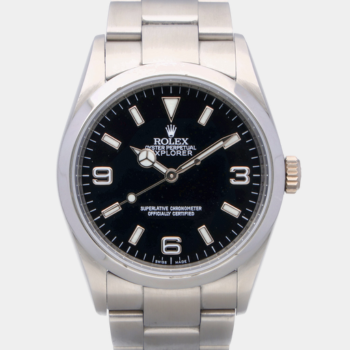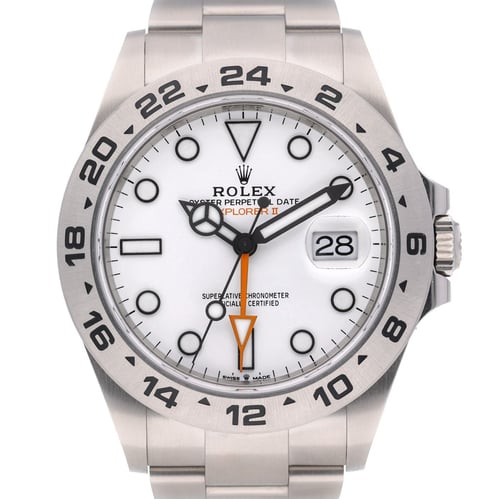When it comes to Rolex, few collections capture the spirit of adventure quite like the Explorer. Designed for mountaineers, cavers, and those drawn to uncharted terrain, the Explorer line has stood as a symbol of resilience and understated style for decades. But within the Explorer family, buyers often face a question: should you go for the Explorer I or the Explorer II?
At first glance, the two may seem cut from the same cloth - both tough, purposeful, and stripped back compared to the more luxurious Rolex sports models. Yet, they serve different needs and offer very different wearing experiences. Here’s a closer look at the Explorer I and Explorer II, their key differences, and what you should consider when choosing between them.

The Explorer I is the essence of Rolex minimalism. Introduced in 1953, it was born in the shadow of the successful Everest expeditions, designed as the ultimate tool watch for mountaineers.
Design
The Explorer I is all about clarity. Its black dial features oversized Arabic numerals at 3, 6, and 9, along with luminous hour markers that are easy to read in any condition. It’s a study in simplicity - no date complication, no rotating bezel, no frills.
Current models come in 36mm and 40mm sizes, giving buyers the option of a traditional fit or something more modern. The smooth bezel and Oyster case keep the design timeless, making the Explorer I arguably one of the most versatile Rolex watches - you can wear it climbing mountains or under a cuff at a black-tie dinner.
Movement
Inside the Explorer I sits Rolex’s latest-generation automatic movement. Current references (124270 in 36mm and 224270 in 40mm) are powered by the calibre 3230, offering improved accuracy, shock resistance, and a 70-hour power reserve.
Who It’s For
The Explorer I is for those who want simplicity and heritage in equal measure. If you’re drawn to the idea of owning one of Rolex’s most understated icons, this is your watch. It’s also an excellent everyday Rolex, thanks to its balance of robustness and wearability.
While the Explorer I is about simplicity, the Explorer II is about functionality. First released in 1971, it was designed with cave explorers and adventurers in mind - people who might spend days underground without knowing whether it’s day or night.
Design
The most obvious difference is the bezel. The Explorer II features a fixed 24-hour bezel with engraved numerals, paired with a large, arrow-shaped GMT hand. This allows wearers to distinguish between day and night hours -or track a second time zone if needed.
The current Explorer II (reference 226570) is 42mm in size, significantly larger than the Explorer I. The white “Polar” dial variant has become especially popular, with its high contrast look and bright orange GMT hand standing out as a modern classic. A black dial version is also available for those who prefer something more understated.
Movement
The Explorer II is powered by the calibre 3285, Rolex’s latest-generation GMT movement. It features a 70-hour power reserve, Chronergy escapement, and independent jumping hour hand - perfect for frequent travellers or those who need a robust dual-time tool.
Who It’s For
The Explorer II is for those who want practicality on top of toughness. If you need a GMT function, prefer larger case sizes, or like the idea of a distinctive fixed bezel, this is the watch for you. It’s less versatile as a dress piece, but unbeatable as a tool watch.


To help make the comparison clearer, here are the standout differences:
If you’re searching for a luxury pre-owned Rolex Explorer I or Explorer II, browse our carefully curated collection below. If you don’t see the model you’re looking for, we’re happy to help source your ideal timepiece. You’re also welcome to visit our luxury showroom for a personalised, one-on-one shopping experience.
Your choice between the Explorer I and Explorer II really comes down to lifestyle and personal taste.
Let us help you find the perfect Rolex Explorer watch for your next adventure. If you don’t see it online, simply get in touch using the form below, and one of our specialist team members will be delighted to source it for you.